There’s a song in ‘Masaan’ (2015) with the lyrics, “Mann Kasturi Re, Jag Dasturi Re”, meaning “The Heart is Emotional, The World is Practical.” It’s a fitting song for the film, which follows the lives of its two protagonists, Devi and Deepak, played by Richa Chaddha and Vicky Kaushal respectively, as they try to pursue their heart’s desires in a cruel casteist and patriarchal world.
Masaan (2015), directed by Neeraj Ghaywan, begins with a close-up shot of an intrigued Devi watching a pornographic video with audible sighs and moans until she’s interrupted by a text on her phone. The viewer later realizes that Devi was preparing to meet her lover Piyush and we soon see the two getting intimate in a shady hotel room that they rented on a pay-per-hour basis.
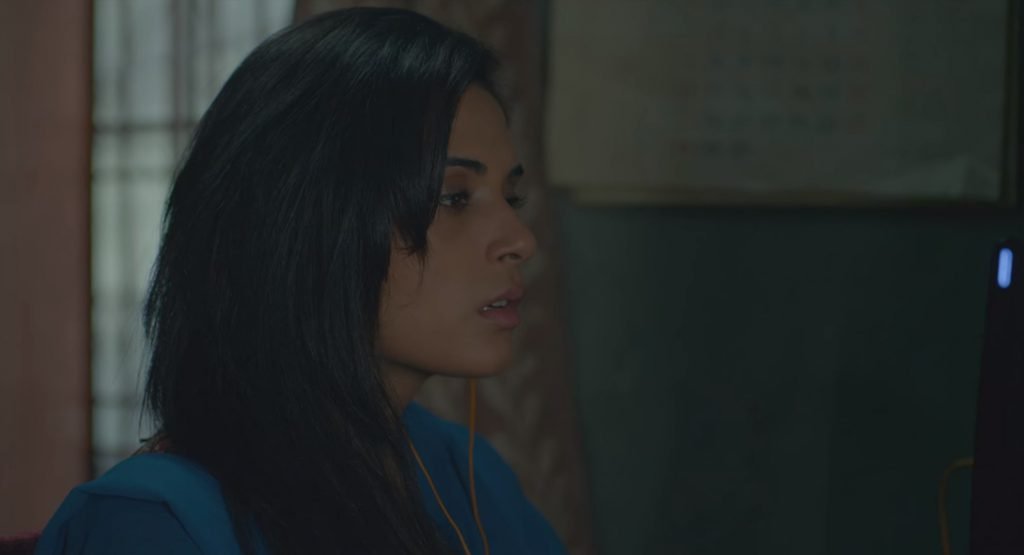
Their encounter oozes with the awkwardness and excitement that are characteristic of first-time sexual acts. When Piyush kisses Devi, she pulls back and remarks, “That was a strange feeling, right?” Then, she guides his hand under her sari over her breast and the camera cuts to the two of them naked, in the midst of sexual intercourse, with Piyush on top of Devi. Suddenly, this incredibly intimate moment is turned upside down as cops shout and scream at them to open the door.
Fearing his father’s reaction upon discovering that his college-going son got caught having premarital sex, a visibly distraught Piyush commits suicide by cutting himself with a glass shard. Meanwhile, a female cop holds a half-naked Devi by her hair as a male cop coerces her to say her name and address while recording her on his phone.
Moreover, Devi’s trauma is compounded by the fact that the cop later uses this video to blackmail Devi and her father into paying him a hefty bribe of 3 lac rupees. He threatens them by saying that if they don’t pay him he will upload the video online, thus maligning Devi and her father’s image in their small town of Banaras. The rest of the film shows Devi’s father struggling to pay such a large sum, but he sees no other choice as the alternative would be risking potential ostracization and excommunication from his community.
Also About Masaan (2015): Ends: Subversive, Unconventional, Endless
***
Masaan (2015) is not the first Hindi film to explore female desire and sexuality, but it differs from previous popular Hindi films. Although the small town that Devi lives in considers it sinful for a woman to have premarital sex, it’s evident that the filmmakers themselves do not hold the same opinion.
Historically, popular Hindi cinema that centered the male hero’s narrative reduced women to stereotypes of the ‘adarsh biwi’ or the ideal wife, who the hero ultimately chooses, or the cliché ‘vamp’, who eventually realizes her wrongdoings and decides to change her ‘apparently’ immoral way of life.
Even seemingly progressive films like Cocktail (2012), set in the cosmopolitan city of London, feature characters like Meera (played by Diana Penty) and Veronica (played by Deepika Padukone) who can be reduced to flat characterizations of the Virgin and the Whore.
Towards the end of Cocktail, the hero realizes that he is actually in love with Meera (the adarsh bahu) and the two end up together while Veronica (the vamp) realizes that she needs to change her lifestyle, which essentially means eliminating short skirts from her wardrobe and abstaining from sex.
Unlike the makers of Cocktail, Ghaywan creates a truly complex and progressive character in Masaan’s Devi. Devi, whose name means ‘goddess’ in Hindi, is acutely aware of the legitimacy of her decision to have consensual sex and the hypocrisy of her society in shaming her for that choice. In a telling scene, she confronts a colleague who’s been harassing her on the phone and says, “Whatever we did, we did it together and consensually”. Devi goes a step further and warns him; she says, “and if you call me again and say filthy things, I will beat you to a pulp”.
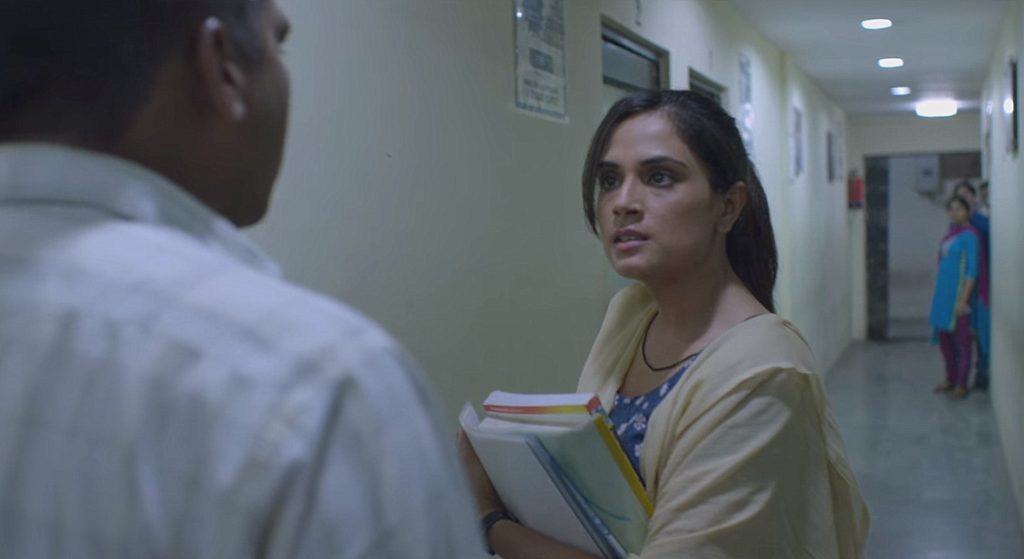
Throughout the film, Devi has a powerful demeanor and tremendous resolve and the viewer realizes that she will not be shamed into internalizing any guilt for having romantic or sexual desire. In another scene, Devi challenges her father who accuses her of creating a scandal and questions why she did so. As he cries and screams at her, she remains calm and responds coolly, “I haven’t created any scandal”.
While Devi doesn’t feel guilt or shame for having premarital sex, she is nevertheless constrained by her circumstances as those around her don’t share the same opinion. She is harassed and shamed at multiple points in the film by strangers as well as her own father. Eventually, Devi leaves the confinement of her small town of Banaras for the larger city of Allahabad, where, hopefully, she won’t be bogged down by the same expectations of morality and honor. Having witnessed the patriarchal hypocrisy of Devi’s previous circumstances, the viewer is inclined to understand and support her decision.
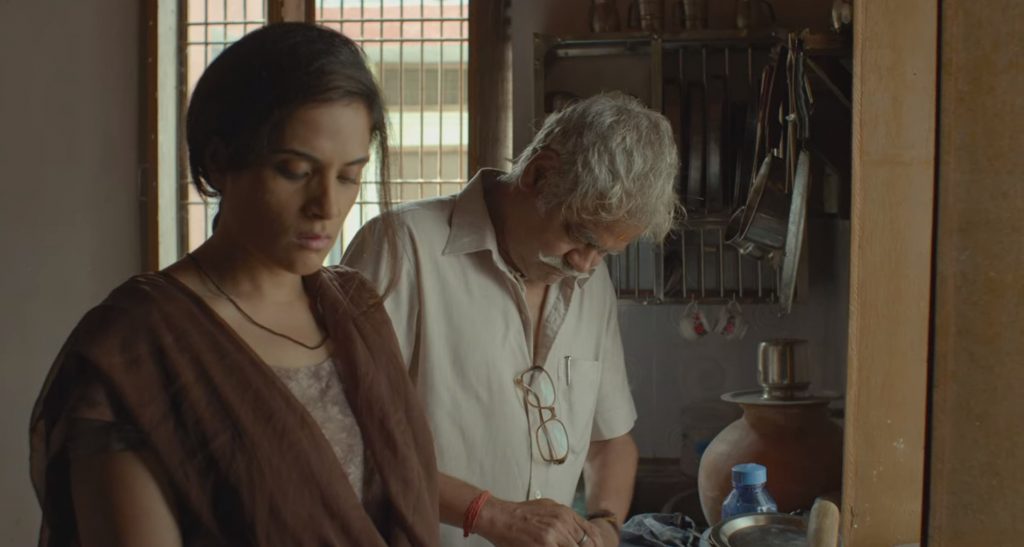
By having the viewer empathize with Devi, rather than condemning or punishing her, Masaan (2015) criticizes the societal instinct to shame and guilt women for their choices, thus marking a significant shift in Hindi cinema.
Also Read: How Neeraj Ghaywan’s Film Amplifies Its Themes Through Visual Storytelling
Moreover, on closer analysis, the essence of the song that this essay began by discussing, “Mann Kasturi Re, Jag Dasturi Re (The Heart is Emotional, The World is Practical) does not seem to apply to Devi. In Devi’s case, her heart is actually totally “practical” in desiring and pursuing consensual sex; rather, it’s the world. with its backward ideas about women’s honor, that’s emotional.
It’s not Devi’s heart, but the world, that still slut-shames a woman with desire and labels her actions as ‘scandalous’, that’s emotional. Luckily, films like Masaan (2015) recognize this blatant hypocrisy and bring it to the forefront, and while doing so make a much-needed intervention in the conversation about consent, desire, and shame.


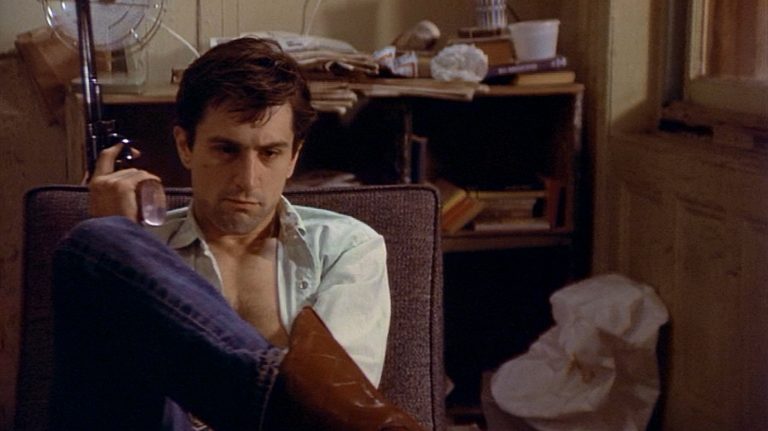
![Taxi [2015]: An Awe-Inspiring Iranian Minimalist Cinema](https://79468c92.delivery.rocketcdn.me/wp-content/uploads/2016/01/201511112_5.jpg)
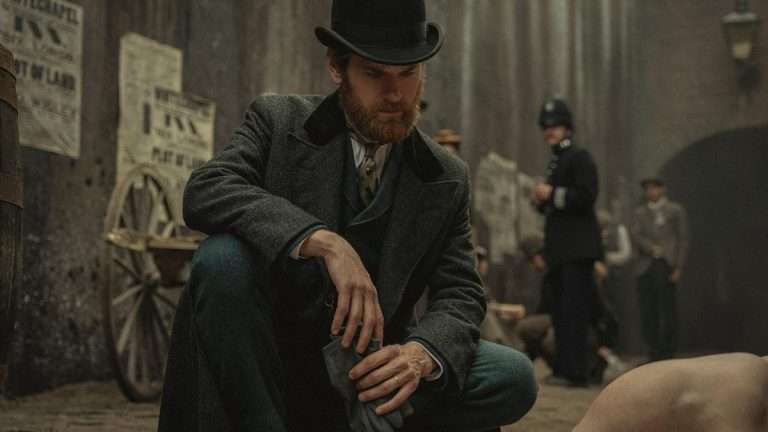

![Taanakkaran [2022] ‘Hotstar’ Review – A Decent Cop Drama on Abuse of Power](https://79468c92.delivery.rocketcdn.me/wp-content/uploads/2022/04/Taanakkaran-2022-768x460.jpg)
![Logan Lucky [2017] – A Brisk Old-School Heist Flick](https://79468c92.delivery.rocketcdn.me/wp-content/uploads/2017/11/cover-3-768x512.jpg)